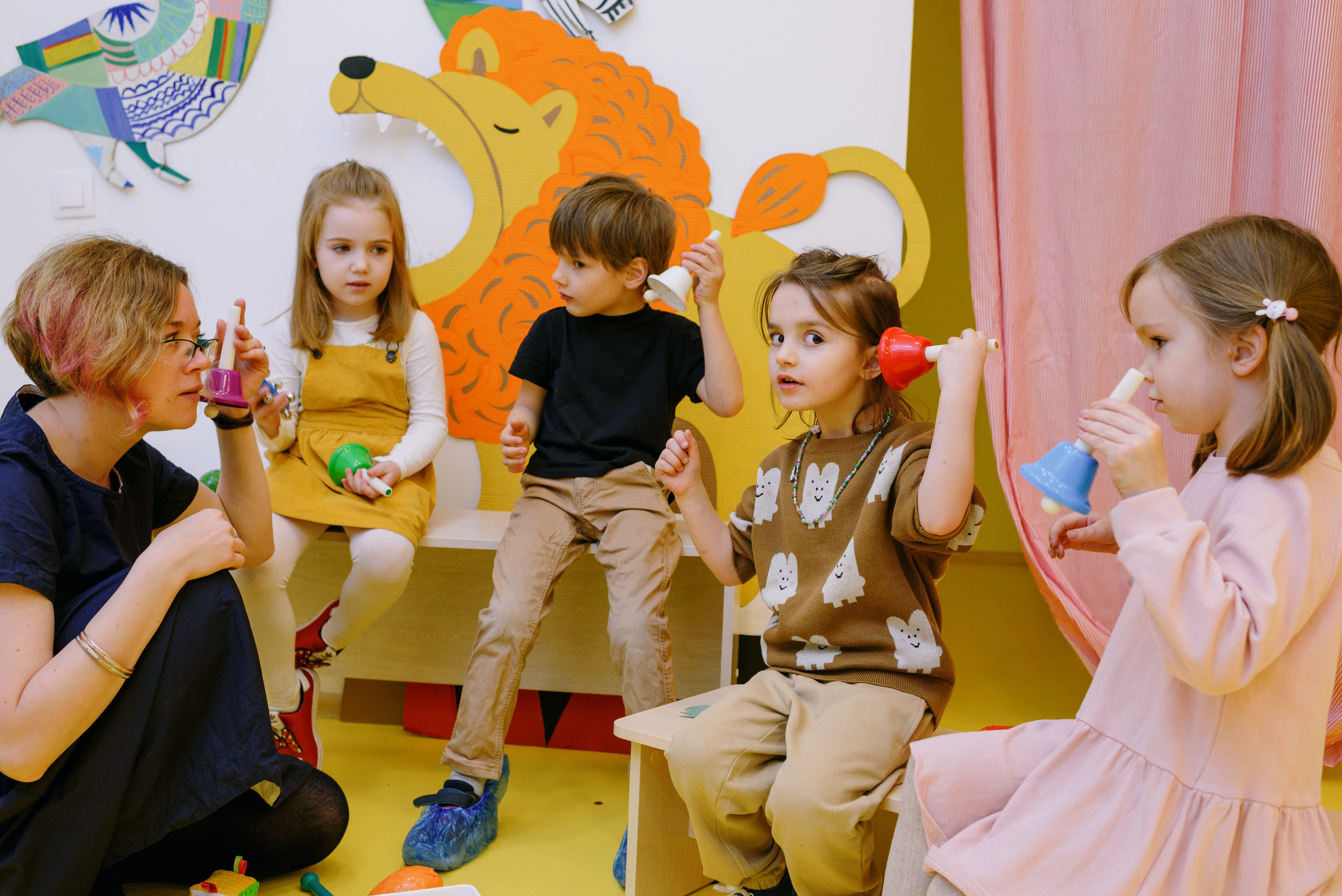categories
You can participate in following categories

Nursery / Preparatory / Kindergarten / Below Grade 1
Any Nursery Rhyme
What Students Can Do:
Children can recite or sing their favorite nursery rhyme, act it out, or even dress up as a character from the rhyme (like Humpty Dumpty, Little Miss Muffet, etc.).
Props Ideas:
- Toy animals, fruits, or storybook characters
- Handmade paper crowns, capes, or animal ears
- Colorful backdrops with simple drawings (e.g., a wall of stars for “Twinkle Twinkle”)
Sound/Video Effects Suggestions:
- Soft background music matching the rhyme
- Cute sound effects like bells, birds chirping, or rain sounds
Animated slides or stickers (stars twinkling, sheep jumping, etc.)

Grades 1–3
If I Had a Superpower
What Students Can Do:
Children can describe their dream superpower and how they would use it to make the world a better place—like stopping pollution, helping the poor, or saving animals.
Props Ideas:
- A superhero cape, mask, or wand
- Posters showing their “missions” or superpowers
- Toys or drawings representing who/what they’d save
Sound/Video Effects Suggestions:
- Heroic background music
- Zooming or flying video transitions
Comic-style pop-ups (e.g., “POW!”, “WHOOSH!”, “ZAP!”)

Grades 4–6
A Day Without Gadgets
What Students Can Do:
Students can narrate a story or act out their day without screens—sharing how they would spend time reading, playing outside, drawing, or connecting with family and friends.
Props Ideas:
- A book, board game, or outdoor toys like a skipping rope
- Simple setup showing a table with no phone/laptop
- Handmade “NO GADGET ZONE” signs
Sound/Video Effects Suggestions:
- Sounds of nature, laughter, or storytelling
- Scene transitions like black-and-white (for boredom) to colorful (for creativity)
Background music that reflects peace or joy

Grades 7–9
Voices of the Youth – What I Want the World to Hear
What Students Can Do:
Students can speak passionately about causes close to their heart—such as climate change, bullying, peace, equality, or education—urging people to take action.
Props Ideas:
- Posters or placards with messages (e.g., “Save the Earth”, “Be Kind”)
- Displaying real-world headlines or personal photos
- Symbolic props like a globe, plant, or candle
Sound/Video Effects Suggestions:
- Inspiring background music
- Slow zoom-in during powerful statements
- Voice overlays or captions for key quotes

Grades 10–12
Redefining Success in Today’s World
What Students Can Do:
Students can challenge traditional ideas of success (marks, money, fame) and instead highlight mental health, creativity, kindness, learning, and balance as modern measures of success.
Props Ideas:
- Vision boards or infographics they create
- Photos or video clips showing real-life examples of unconventional success
- Books, journals, or sports/art instruments representing balanced life goals
Sound/Video Effects Suggestions:
- Calm, thought-provoking music
- Split screen to show “old vs new” definitions of success
- Subtitle key phrases or quotes from thought leaders
Presentation Projects
Creative Video Guidelines
Any Nursery Rhyme
What They Can Do
Focus on clear, loud recitation with big facial expressions and simple, repeating actions. They can tell a mini-story with their face and voice.
Props Ideas
- A stuffed animal that matches the rhyme (e.g., a lamb for Mary Had a Little Lamb)
- A simple drawing they hold up
- A relevant hat or piece of clothing (a wool hat for Little Bo Peep)
Sound/Video Effects
A parent could play a few seconds of simple instrumental music at the start/end.
Use a virtual background of a farm, a starry night (for Twinkle Twinkle), or a hill. A "spotlight" filter can keep focus on them.
If I Could Be Any Animal
What They Can Do
Describe the animal's appearance, habitat, and why they chose it. They should use their body (e.g., pretend to swing a trunk, hop, or roar) and change their voice.
Props Ideas
- A homemade paper mask or ears
- A drawing or picture of the animal
- The animal's favorite "food" (e.g., a plastic banana for a monkey)
Sound/Video Effects
Play a short, clear animal sound effect when they first "reveal" their animal.
Use a green screen or virtual background of the animal's habitat (jungle, ocean, savannah). A "cartoon" filter could be fun for this theme.
The Time I Faced a Fear (or Learned Something New)
What They Can Do
Structure a clear story: Set the scene, explain the challenge, describe what they did/said/felt, and share the outcome/lesson. Use expressive tone to build emotion.
Props Ideas
- The object of the fear (e.g., a book for learning to read, a bicycle helmet)
- A "before and after" drawing or photo (held up to the camera)
- A trophy, certificate, or the finished product (e.g., a baked good, a craft)
Sound/Video Effects
Subtle mood music (e.g., suspenseful tones when describing the fear, triumphant music at the end).
Use a split-screen effect (if possible) to show a "scared" photo vs. a "proud" live face. Zoom in slightly on their face for emotional moments.
The Greatest Challenge My Generation Faces
What They Can Do
Move beyond opinion to informed perspective. State the challenge clearly, explain why it's significant for their generation, suggest a starting point for a solution, and end with a call to action.
Props Ideas
- A powerful statistic written large on a poster behind them
- A symbolic object (e.g., a wilting plant for climate change, a tangled cord for digital misinformation)
- A news headline printed out and held up
Sound/Video Effects
A short, impactful audio clip (e.g., 3 seconds of news chaos, climate protest chants, keyboard typing).
Share their screen briefly to show a simple graph or powerful image. Use a professional, solid-color background. Lower-third titles (name and topic) add a polished feel.
A Message I Would Send to My Future Self in 10 Years
What They Can Do
Blend introspection with artistry. The tone can be hopeful, aspirational, cautionary, or humorous. Reflect on current passions, values, and fears, and project them into the future.
Props Ideas
- A physical sealed "letter" they address to themselves
- An object representing their current goal (a paintbrush, a coding manual, a soccer ball)
- A childhood photo held up to the camera
Sound/Video Effects
A subtle, looping ambient sound (clock ticking, gentle piano, nostalgic video game music). They could record their message as a "voiceover" while showing related images.
Use a vintage or "glitch" filter to symbolize time. Superimpose a translucent clock graphic. Film in a meaningful location (their room, a park) to add depth. A slow zoom in/out can enhance the reflective mood.
